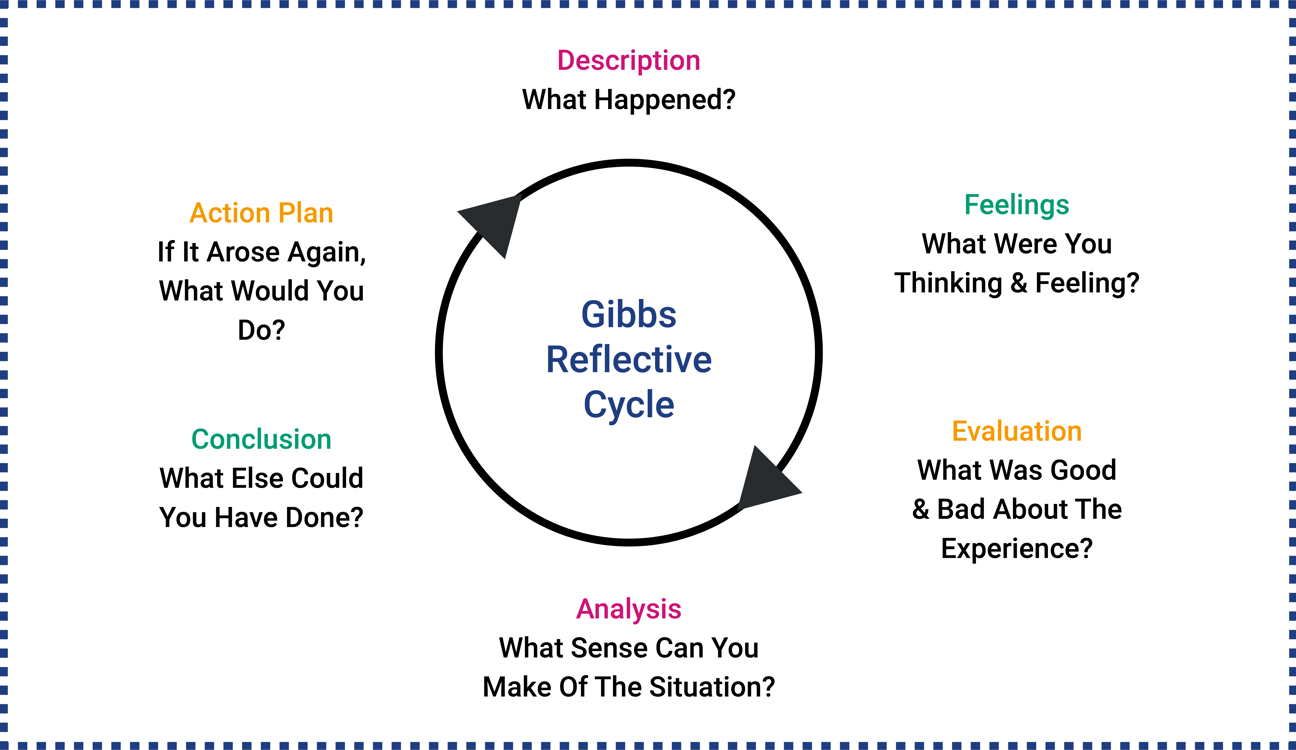Understanding Gibbs' Reflective Cycle
Study Skills For Apprentices
For our apprentices, it is important to use effective study skills to properly support their learning and education. One of the various study skills is that of reflection, and Gibbs' Reflective Cycle stands out as a valuable method for developing critical thinking and self-awareness.
Gibbs' Reflective Cycle was developed by Graham Gibbs in 1998. The aim of this model is to assist in future planning, by learning from past experiences. The cycle has six stages, each one taking the individual through a journey which will help them to achieve the best outcomes going forward.
The Six Stages

- Description: Describe the experience
- Feeling: Note your feelings and thoughts about the experience
- Evaluation: Evaluate the experience, both positively and negatively
- Analysis: Analysis the experience to make sense of the situation
- Conclusion: Conclude your thoughts which what you learned, and what you would do differently next time.
- Action Plan: Create an action plan for how you would deal with these sorts of situations going forward.
Stage 1: Description
The focus on this stage is simply on what exactly happened. You will cover your feelings and main conclusions later. Try to be detailed in your description, as this will help you in later stages.
Stage 2: Feelings
What were your feelings after the situation? How do you think other people were feeling? How do you feel about the situation now?
Try and be as honest and transparent as possible. Explore your thoughts and feelings, and think about how these may have impacted the experience.
Stage 3: Evaluation
Now is the time to evaluate the situation in full. What worked well, and what didn't work so well? How did both you and others contribute to both the positives and negatives.
As with stage 2, try to be as honest as possible, but also try to avoid being overly negative in your assessment. You can learn just as much from positive outcomes as you can negative ones.
Stage 4: Analysis
Until now, you have focused purely on the outcomes and details of the situation. Now is the time to ask the important question; why?
Why did things go well? What caused things to not go well? Try to make sense of the situation, and identify the root causes of every aspect of the situation.
Stage 5: Conclusions
Now that you have analysed the situation in full, it is time to bring together your final thoughts into a summary. What have you learned from this situation? What else could you do next time? Are there any skills you can develop to assist you better next time?
All of your work in the previous sections should help you with this stage.
Stage 6: Action Plan
Now that you have reflected on the situation, what is your plan for the future? When you find yourself in a similar situation, what would you like to do differently? How will you develop the required skills? How will you ensure you act differently next time?
This is the stage which ensures that you learn from your past experiences, using past outcomes to inform your future, and allow you to approach situations in an informed, confident way.
As you apply Gibb's Reflective Cycle to your learning, you will find that it supports and enhances your learning in many ways. However, you may find that it is a valuable tool beyond simply learning, and can help you to reflect and analyse many situations in your personal and professional career.
To keep up-to-date with our blogs, guides, and industry developments, follow us on LinkedIn or Facebook.
All of the Apprenticeships and Workshops we offer are purpose-built with accessibility and inclusion in mind. You can view our apprenticeships, view our courses or contact us to find out more about how we can empower you or your workforce with apprenticeships or training programmes.
About Dynamic Training
Dynamic Training are an apprenticeship, adult education, and bespoke training specialist. Working with a diverse customer base across a variety of sectors, with a significant presence within the healthcare sector, we believe passionately in providing high-quality and inclusive education at all times, empowering both employers and employees to reach their aspirations.
Dynamic Training have an incredibly passionate and experienced team of coaches, with a diverse range of industry experiences, who aspire to deliver the very best training and support. We stand out from other training providers through our strong commitment to accessible education, as well as our prestige within the healthcare sector.



Dynamic Training are experts in Healthcare Education. Follow our blog for the latest industry news, insight and advice from industry experts.

Dynamic Training has an expert team of trainers delivering high-quality apprenticeships across the health, social care and business sectors, making sure you get the best out of your workforce.

Dynamic Training cares deeply about creating an inclusive and accessible enviroment for our learners. We have a proud record of getting the best out of every learner and adjusting our training to suit them.
Learn more about how Dynamic Training has provided a positive and inclusive learning environment.